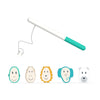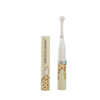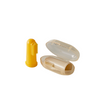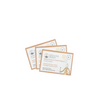Mindfulness Expert, Live Well With Lou, Teaches Positive Affirmations
Lou is on a mission to help tired parents find space in their lives to feel energised and more like themselves again. She is a Health Coach, Mindfulness Teacher and a Mum-of-Three (soon to be four!), who goes by the name ‘Live Well With Lou’. Lou has shared her Two-Minute Mindset Tool with Matchstick Monkey and we are delighted to bring her toolkit to our readers.
The 2-Minute Mindset Tool that Lou teaches involves using Positive Affirmations to bring that positivity into your life. Read on to discover more about the Two-Minute Mindset Tool and how to use Positive Affirmations for you.
Positive Affirmations: The 2-Minute Mindset Tool
This toolkit is designed to help you push aside your inner critic and get you into the best mindset to tackle whatever the day throws at you. It can help if you need to dial down stress, address feeling overwhelmed and reduce negative thoughts by welcoming more positivity, energy and motivation into your life.
What are Positive Affirmations?
Affirmations are positive reminders or statements that can be used to encourage and motivate yourself. Often it’s a lot easier to affirm others than it is ourselves, but we need to remember to encourage ourselves as well. Self-affirmation is about validating the positive aspects of yourself to help you live in alignment with your values, beliefs, and moral principles.
How Do Affirmations Work?
Practising affirmations is a powerful way to improve your mindset on a daily basis, and research has shown that they can actually increase our feelings of self-worth. Affirmations can remind you of the resources you have to cope with whatever happens to you, and they can broaden your perspective to help you see things in a different light. By challenging your limiting beliefs on a daily basis and reminding yourself of what you’re capable of, you can literally rewire your brain to become a healthier place.
Affirmations are important because they shift the way you deal with what’s happening to you. Our brains are naturally inclined to remember negative situations more than positive ones – it’s called the negativity bias. If you’ve ever wondered why you can remember every single critical thing anyone has said to you but can’t seem to recall the compliments, this is why. Negative memories stick because of the way our brains are wired.
Luckily, the neural pathways in our brains are not fixed. Rather, they are flexible and can be altered over time. This means that our minds can literally be rewired, which is great news if you thought you might be stuck in the same thought patterns forever. There’s also MRI evidence suggesting that certain neural pathways are increased when people practice self-affirmations. In order to change our brains, we need to provide our minds with frequent reassurance.
Choosing An Affirmation
Choose what you need to hear based on how you feel and how you want to cope. Affirmations can be calming, confidence-boosting, energising, motivating and grounding for example.
I’ve collated some of my favourite affirmations for dealing with stress and uncertainty because I feel everyone needs a little help with this at the moment. The affirmations in this toolkit have been curated to help you cope with tough times.
Start by choosing an affirmation from the list in this guide that resonates with you. Pick one that will give you what you need that day and help you cope that day.
A really important thing to note about affirmations is that if they are going to work, they need to be realistic and authentic. Some positive affirmations can feel really corny and utterly unbelievable like, “I am full of peace and joy”. Telling yourself that you’re full of peace and joy when you’re actually full of tension and worry, probably isn’t going to feel authentic or true or be helpful.
Yes, they are powerful, and the more you practice them the more your brain tunes into the truth of the words, BUT those words have to be realistic and authentic to you. What feels true and right and helpful, certainly varies from person to person too. So pick an affirmation that resonates and then you can rewrite it using words and language that you would feel comfortable using.
Pick something to use as an initial idea or starting point and make it your own if you need to. For example, you can make them more specific by stating something in particular that you are feeling and a particular coping strategy that you will use. When I choose an affirmation, I try to acknowledge my situation, feelings and focus on how I want to cope, so that I can do what I want to think, feel, or do in response. The other really important thing to note here is that you don’t have to go through a massive list of affirmations every day. Instead, choose 1-2 affirmations that really speak to you on that day, at that moment for how you are feeling.
Pick one that’s going to reassure you and encourage you to keep moving forward.
How to Use Affirmations
If you’ve ever resisted using affirmations, it’s probably because you thought you had to talk in the mirror and convince yourself that you’re doing great when you’re actually about to have a meltdown. When really, you don’t need to say affirmations to yourself in the mirror, or even say them out loud, for them to be effective. All you have to do is write them down with intention.
You also want to repeat the statements in your head a few times. Repetition is the best way to reframe and rewire your brain. Doing this consistently will help to reinforce the positive thoughts and feelings that you’re trying to build. So you want to repeat the affirmation you have chosen regularly throughout your day. As a mindfulness coach, I find that it really helps to pop the affirmation on a post-it note and stick it somewhere I will see it regularly that day, so it acts as a reminder to repeat the words to myself.
When we’re under a lot of stress, we tend to forget things, so it’s useful to have your affirmation in a visible place to remind you to repeat the affirmation to yourself throughout the day. You could pop your affirmation on your fridge door, on the side of your laptop screen, or on your bathroom mirror. I like to pop mine in a piece of paper and then fold it and put it in my pocket. Feeling it there in my pocket acts as an anchor to remind me to repeat the words I’ve chosen each time I feel it.
Stick With It
Sticking with any type of mindset practice is how you can truly change and rewire your brain. The same is true for positive affirmations. When you start using affirmations, you might not believe the words of the affirmation to be true. Please don’t let that discourage you from actively using affirmations. Positive affirmations work miraculously when it comes to supporting your body, mind and soul. Day-by-Day you will reinforce the messages and train your subconscious mind to tune into the truth of the affirmation more often. It really is MAGICAL stuff!
You really can attract more of what you want to feel and experience. With regular use, positive affirmations rewire your system both energetically and physically. Regular practice helps to overwrite old thought patterns and old self-talk, and negative chatter in the brain and body. The timeline is going to look different for everyone, however, many people experience huge benefits after a few weeks.
Try the following positive affirmations from my 2-Minute Mindset Toolkit and add them to your own. Use the advice above and begin to practice using your positive affirmations.
- I feel my best when I practise self-care and relaxation
- I am making positive, healthy choices that will help in the long-term
- This is stressful, so I will take extra good care of myself
- I choose peace over perfection
- How I feel right now doesn’t have to determine my whole day
- My mind is calmest when I [fill in the blank] (e.g. take a walk, talk to a friend)
- Putting my needs first isn’t selfish…my health & wellbeing depends on it
- By taking good care of myself, I’m better able to take care of others around me too
- I give myself permission to thrive and I allow the positive energy of love to flow through me
- When I start to feel drained, I take time alone to replenish my energy
- As I breathe slowly and deeply, I become more relaxed and energised
- I regularly do those things which energise and replenish me
- I always make time to replenish my energy levels
- I give myself space to determine what I need from the day, not what the day needs from me
- I take time each day to wind down and relax so I don't get overtired
- I will stay present-focused and take this one day at a time
- I’m doing what I can to remain physically and emotionally healthy
- I will focus on what I can control and release the rest
- My fear is understandable, but constantly worrying about the worst-case scenario isn’t helpful.
- I will try to be kind and gentle with myself
- When I feel overwhelmed, I will choose a healthy way to cope
- I am really struggling right now. I am allowed to feel this way. I am not alone. May I be kind to myself and give myself what I need in this moment
- Self-care is not selfish – it is self-preservation
- I can be both afraid and courageous at the same time
- I’m doing the best that I can, and that’s all I can ask of myself
- When I’m struggling, I will ask for help
- I can always find something to be grateful for
- It’s healthy to take a break – to rest or have fun
- I can lean on others for support. I’m not alone in this
- I’m stronger than I think
- I don’t have to have this all solved today
- I am doing what I can with the knowledge and skills I have to survive this
- When I have done all I know how to do, I choose to let my mind rest
- I welcome fear as a sign to be careful but choose to let go of it when it no longer serves me
- I am doing the best I can, and thus choose to release myself from guilt and shame
- I am slowly becoming the kind of person who can survive this storm
- I am not a failure, but a survivor. I am daily in the process of surviving
- My commitment to showing up tomorrow overshadows the mistakes I have made
- I am holding on in the dark to what I know to be true in the light, in better times
- I release all negative emotions from the day
- I let go of any stress and anxiety from today
- All I can do is my best
- It’s ok to feel it all
- It’s hard because it IS hard
- I choose carefully what goes onto my calendar - now is NOT a time for hyper-productivity
- I give myself permission to rest
- I choose to be calm and centred, regardless of the situation
- My body and mind need to rest and recharge, so I will let myself rest without judgment
- Today I allow time (even 2 minutes) for self-care and rejuvenation
- Today I choose to find small pockets of joy, even on a tough day there are tiny moments of joy to be found
- I do not have to feel positive all the time – I am a human NOT a robot
- Putting my own need first isn’t selfish. By taking good care of myself, I am able to take better care of those around me
- I give myself permission to not have it all figured out
We hope you have found that these affirmations bring you some comfort and support during these difficult times. Lou advises readers to keep practising them every day, stick with it, and you will start to see results in terms of a shift towards a more positive and healthy mindset and in your ability to cope with any challenges you face.
If you’re interested in receiving coaching and have found Lou’s Mindfulness Expert article interesting, visit Live Well With Lou to discover more and follow Lou on Instagram (@live_well_with_lou).
Related blog: How To Get Your Baby To Sleep Through The Night





























